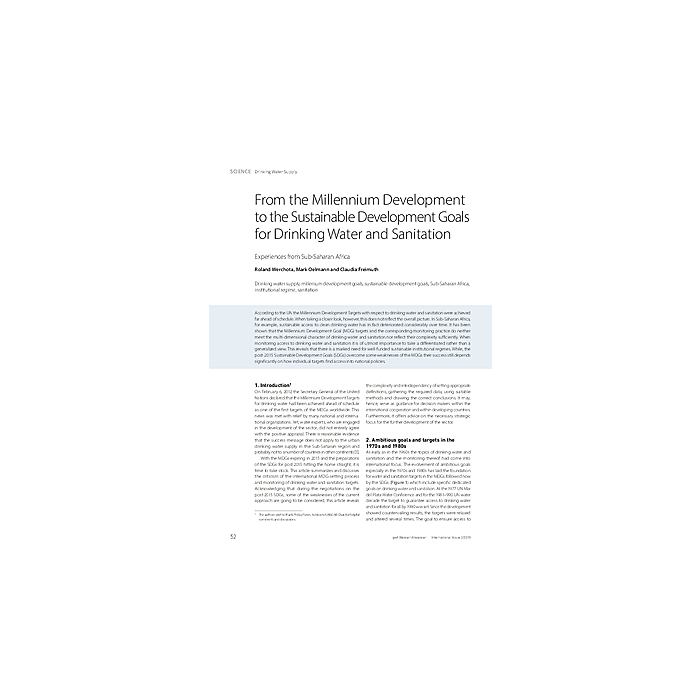From the Millennium Development to the Sustainable Development Goals for Drinking Water and Sanitation
4,90 €
Auf Lager
Artikelnummer
05399_2015_SP2_06
Experiences from Sub-Saharan Africa
According to the UN the Millennium Development Targets with respect to drinking water and sanitation were achieved far ahead of schedule. When taking a closer look, however, this does not reflect the overall picture. In Sub-Saharan Africa, for example, sustainable access to clean drinking water has in fact deteriorated considerably over time. It has been shown that the Millennium Development Goal (MDG) targets and the corresponding monitoring practice do neither meet the multi-dimensional character of drinking water and sanitation nor reflect their complexity sufficiently. When monitoring access to drinking water and sanitation it is of utmost importance to take a differentiated rather than a generalized view. This reveals that there is a marked need for well-funded sustainable institutional regimes. While, the post-2015 Sustainable Development Goals (SDGs) overcome some weaknesses of the MDGs their success still depends significantly on how individual targets find access into national policies.
| Autoren | Roland Werchota / Mark Oelmann / Claudia Freimuth |
|---|---|
| Erscheinungsdatum | 01.01.1970 |
| Format | |
| Zeitschrift | gwf - Wasser|Abwasser - Special 2 2015 |
| Verlag | DIV Deutscher Industrieverlag GmbH |
| Titel | From the Millennium Development to the Sustainable Development Goals for Drinking Water and Sanitation |
| Untertitel | Experiences from Sub-Saharan Africa |
| Beschreibung | According to the UN the Millennium Development Targets with respect to drinking water and sanitation were achieved far ahead of schedule. When taking a closer look, however, this does not reflect the overall picture. In Sub-Saharan Africa, for example, sustainable access to clean drinking water has in fact deteriorated considerably over time. It has been shown that the Millennium Development Goal (MDG) targets and the corresponding monitoring practice do neither meet the multi-dimensional character of drinking water and sanitation nor reflect their complexity sufficiently. When monitoring access to drinking water and sanitation it is of utmost importance to take a differentiated rather than a generalized view. This reveals that there is a marked need for well-funded sustainable institutional regimes. While, the post-2015 Sustainable Development Goals (SDGs) overcome some weaknesses of the MDGs their success still depends significantly on how individual targets find access into national policies. |
Eigene Bewertung schreiben


